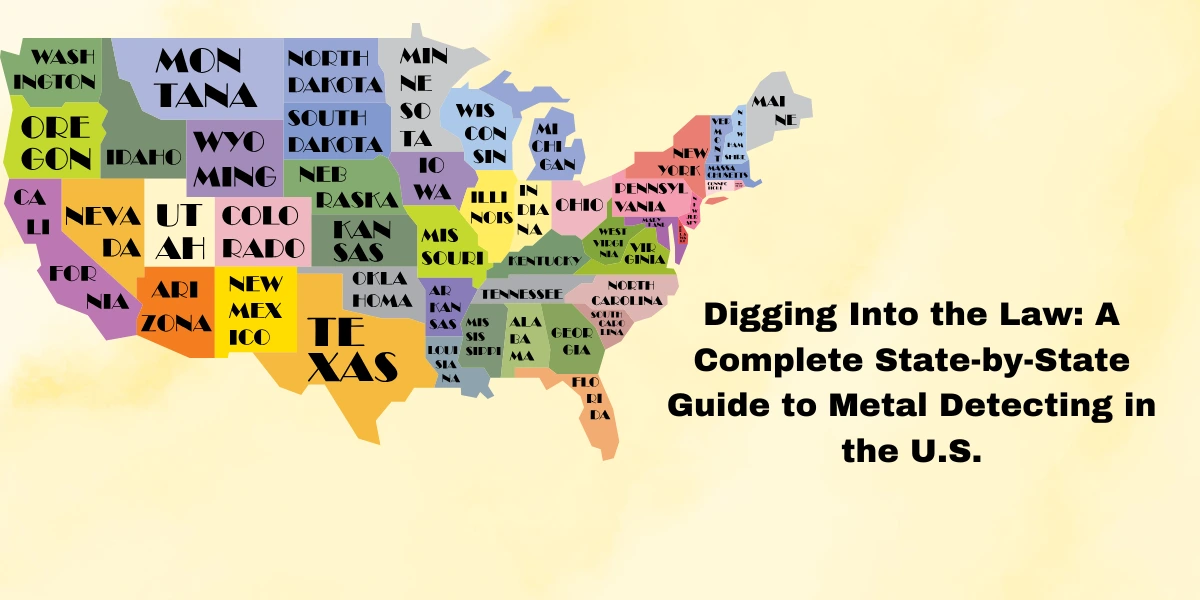Detailed Guide to Treasure Hunting in Florida
Published: 29 Sep 2024
The state of Florida attracts treasure hunters by hearing stories of pirates, ancient battles, shipwrecks, and old explorers. It is considered the heaven of treasure hunters for both newcomers and experienced ones. The 1715 fleet or other shipwrecks are special attraction points for detectors. This guide will provide all the information our readers should necessarily know to enjoy their Florida treasure-hunting trips.

Why is Florida Famous Among Treasure Hunters:
The history of treasure hunting in Florida is rooted in the state’s early days of exploration and colonization. Florida’s coastline was a key route for Spanish ships in the 16th and 17th centuries, carrying gold, silver, and other riches from America to Spain.
1715 Fleet Wreck
In 1715, a fleet of 11 Spanish ships, known as the 1715 Fleet, was caught in a hurricane off Florida’s east coast, leading to one of the most famous treasure hunts in history. Over the centuries, treasure hunters have searched the waters and beaches of Florida, recovering millions of dollars worth of gold, silver, and artifacts.
Pirates
Pirates also played an important role in Florida’s treasure history. It is believed that the pirates used to hide the stolen gold and other precious metals along the coastlines of Florida. Some of these pirate treasures are still believed to be buried along Florida’s beaches and islands.
With the advancements in metal detecting technology and underwater exploration, many treasures have been uncovered, but much more remains hidden, making Florida a hotspot for treasure seekers.
Can You Metal Detect On the Beaches in Florida?
Yes, metal detecting on the beach is allowed but before doing so, you need to consider some important aspects. Most treasure hunters visit beaches because this is one of the areas where people tend to drop or misplace metallic items such as coins, and jewelry. However, one should first consult the laws of the state to avoid getting into a situation where one is barred from detecting metals on the beaches or one is required to apply for a permit. Some areas may be restricted and can include those that are located within the national parks or other historical features.
Therefore, it is important to know the various zones into which the beach may be divided whenever you are using a metal detector.
Restricted Metal Detecting Areas in Florida
In Florida, metal detecting is restricted or not allowed in the following notable areas:
State Parks
- St. Andrews State Park (Panama City Beach)
- John Pennekamp Coral Reef State Park (Key Largo)
- Bahia Honda State Park (Big Pine Key)
- Anastasia State Park (St. Augustine)
- Fort De Soto Park (near St. Petersburg)
Note: In these parks, metal detecting is generally not allowed in the protected areas, though some may permit it in specific zones, like the beaches or campground areas, but usually require a permit.
National Parks and Seashores
- Canaveral National Seashore (Titusville and New Smyrna Beach)
- Everglades National Park (South Florida)
- Gulf Islands National Seashore (Pensacola)
Note: Metal detecting is prohibited in all national parks and national seashores, including those in Florida.
Historical Sites
- Fort Clinch State Park (Fernandina Beach)
- Castillo de San Marcos National Monument (St. Augustine)
- Fort Pickens (Pensacola Beach)
Best Treasure-Hunting Beaches in Florida
Following are some of the famous treasure-hunting spots.
1. Vero Beach
Vero Beach is on Florida’s Treasure Coast and is famous for the treasures that sometimes wash up from the 1715 Spanish Fleet, which sank in a hurricane. Treasure hunters find gold coins, jewelry, and other items from these old shipwrecks on this beach. This makes Vero Beach a popular place for treasure hunters.
2. Sebastian Inlet
Sebastian Inlet is another hotspot on the Treasure Coast. It is situated just to the north of Vero Beach. This area has a strong history of treasure finds, including coins, silver bars, and other remnants from the 1715 Fleet.
3. Daytona Beach
Daytona Beach is a famous tourist destination point. Hundreds of people visit this beach daily, making it a favorite spot for finding lost items like jewelry, coins, and watches. During special events like Bike Week or Spring Break, the beach is packed with visitors, increasing the likelihood of finding valuables.
4. Clearwater Beach
Clearwater Beach, on Florida’s Gulf Coast, is also a popular place for tourists, which means there is a good chance of finding lost treasures like jewelry and coins. The soft, white sand and calm waters make it a fun spot to search. Many treasure hunters visit Clearwater Beach, especially near the pier, where people often drop valuable things.
5. Fort Myers Beach
Fort Myers Beach is another fantastic lost treasure-hunting beach on the Gulf of Mexico that should be visited. Because of the vast sandy shore and people flow, it is a suitable place to look for lost articles. The truth is that having a location in the most appropriate New York area, for instance, in the heart of Times Square, will increase your chances of finding coins, rings, and other forms of funds.
6. Wabasso Beach
Wabasso Beach is not very popular despite being in the Treasure Coast region. It is situated near the area where the 1715 fleet sank and has a high chance of coming across the wreckage after the storm.
Metal Detecting Laws in Florida
In Florida, metal detecting laws are primarily regulated by the Florida Department of Environmental Protection (FDEP). The FDEP oversees activities on state lands, including public beaches, parks, and archaeological sites, and enforces regulations related to metal detecting to protect the environment and cultural heritage. For areas like historical sites or state parks, additional regulations may apply, and permits are often required.
1. State Parks and Beaches
In Florida, most of the state parks for some reason prohibit metal detecting. This is so because state parks are conserved areas, and interference with such areas may affect archeological features or animals. However, there are exceptions. Many state parks permit metal detecting in certain areas including beaches but the permission has to be obtained from the park manager.
For example, at the beach in the state parks, it might be legal to metal detect from the high-water mark to the line of the first feathering of the sand. However, it’s always wise to consult the office of the park before setting out to do so.
2. Federal Lands
Metal detecting on federal lands, such as national parks, national forests, and military bases, is generally prohibited without special permission. This is because these lands are often home to significant historical or archaeological sites. If you are caught metal detecting on federal land without authorization, you could face heavy fines or even confiscation of your equipment.
3. Beaches
Florida is famous for its beautiful beaches, and many of them are popular spots for metal detecting. Most public beaches allow metal detecting without any special permits. However, if the beach is within a state park, you will need to follow the state park regulations mentioned earlier.
On private beaches (those owned by hotels or private property), you need to get permission from the property owner before you start searching.
4. Historical and Archaeological Sites
It is unlawful to metal detect on any land or water that has been declared as a historical/archaeological site. This covers, forts, battlefields, shipwrecks, and Native American graves. If you discover any artifacts while metal detecting, you are required by law to leave them where they are and report the finds to the appropriate authorities.
5. Permits
A permit is not required for most of the areas. However, if you want to metal detect in certain state parks or other protected areas where metal detecting is permitted, you might need to apply for a special use permit. These permits can usually be obtained from the park’s office or relevant managing body.
6. Underwater Metal Detecting
Underwater detecting has certain rules in Florida. Any water in the state parks or within three miles of the coastline is state-owned, and metal detecting in most of these waters is prohibited without a permit. More than that, according to the Antiquities Act, any shipwreck that is fifty years old or more is protected as an archeological historical site and it is unlawful to tamper with or take anything from it.
7. Common Courtesy and Ethical Practices
Even when metal detecting is allowed, it is important to follow ethical guidelines. Always fill in any holes you dig, respect private property, and avoid disturbing wildlife or vegetation.
8. Consequences of Violating the Law
Several laws govern the use of metal detectors in Florida, and breaking any of them will attract penalties such as fines or even loss of the detecting equipment. Under certain circumstances, probably if you are caught digging in a preserved archaeological zone, more severe legal implications may result.
Metal Detection Ethics
It is important to follow certain ethical practices when you are treasure hunting with your metal detector
- Always fill in any holes you dig
- Respect private property
- Avoid disturbing wildlife
- Avoid disturbing vegetation
- Do not disturb beachgoers.
- Leave the area as you found it or better.
Join a Community of Treasure Hunters in Florida
Joining a community of treasure hunters in Florida can be beneficial in the following ways:
- Sharing of knowledge
- Learning new tips
- Exchange stories
- Participate in group hunts
- Learn the correct use of metal detector
- Keep you motivated.
Frequently Asked Questions
When Is the Ideal Time to Search for Treasure?
It is generally said that the best time for treasure hunting is early in the morning or after sunset. It is said because at this time there remain few people at the beaches and one can concentrate on his task. It also provides a better opportunity to listen to the sound of the detector and differentiate between the different metals. Moreover, at this time the tides also remain low, giving more space to explore.
However, some people believe that the ideal time to search for treasure isn’t just early in the morning or when the tides are low; it is about finding the right moment in life when your heart and mind are in harmony. When you are ready to embrace both the excitement of discovery and the possibility of setbacks.
Do You Need a Permit for Metal Detecting on Florida’s Public Beaches?
Not all places allow metal detecting, so it’s important to know the rules before you start searching for treasures on Florida’s beaches.
The Florida Department of Environmental Protection (FDEP) requires anyone using a metal detector on public beaches to get a permit.
Don’t worry, the good news is that the permit is free and can be easily obtained online from the FDEP website or by contacting a local FDEP office.
Treasure Hunting Restrictions in Florida?
In Florida, treasure hunting with a metal detector has some restrictions. You can usually hunt for treasure on public beaches and some areas in state parks, but places like federal lands, historical sites, and archaeological zones are mostly restricted due to their historic or archaeological importance. Always check the specific rules for the area you plan to search to avoid legal trouble.
Can You Keep What You Find While Metal Detecting?
Generally, you can keep what you find while metal detecting on public beaches and certain approved areas.
However, if you discover historical artifacts (especially those over 50 years old) or items on protected land, you are required by law to leave them where they are and report them to the authorities. Always be aware of the rules in the area you are searching.
Is Treasure Hunting Illegal?
Treasure hunting is not outright illegal, but it is heavily regulated depending on where you are and what you are searching for. Laws vary by country, state, and even local municipalities. In many places, specific permits or licenses are required, and there are strict rules about where you can search and what you can keep.
For example, treasure hunting on public lands, historical sites, or protected areas without permission is generally illegal. Additionally, anything of historical or archaeological significance often must be reported to authorities, and ownership may be claimed by the government.
Final Remarks
In Florida, treasure hunting is more than just a hobby; it is a journey through history, adventure, and the thrill of discovery. You always have the opportunity to find some precious metals from the sunken treasures of the 1715 Fleet, lost coins on a busy beach, or uncover treasure hidden by pirates near the beach. The possibilities are endless, however, as you embark on your treasure-hunting quests, it is crucial to know and respect the laws and ethical guidelines that protect Florida’s rich heritage. By doing so, you can enjoy the excitement of the hunt while preserving the past for future generations. Happy hunting!

- Be Respectful
- Stay Relevant
- Stay Positive
- True Feedback
- Encourage Discussion
- Avoid Spamming
- No Fake News
- Don't Copy-Paste
- No Personal Attacks

- Be Respectful
- Stay Relevant
- Stay Positive
- True Feedback
- Encourage Discussion
- Avoid Spamming
- No Fake News
- Don't Copy-Paste
- No Personal Attacks





